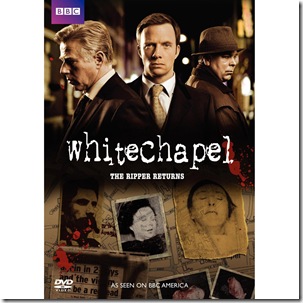Detective Inspector Joseph Chandler is on the fast track, checking off the requirements to make it to the top. When he’s sent to Whitechapel to take charge of a murder investigation – a simple domestic, everyone says – things turn out to be so very not simple. Despite the doubts of his men – and especially tough, streetwise Detective Sergeant Ray Miles – he comes to believe that the murder is part of a series that will duplicate the infamous Jack the Ripper kills from Victorian times! This is the premise of the first series/season of Whitechapel – Now on DVD as Whitechapel: The Ripper Returns.
When Doctor Who’s Steven Moffat wondered how Sherlock Holmes would fare in the present, what with modern technology and police training, it led to the delightfully offbeat BBC series, Sherlock – only the most recent example of Holmes in the present, and one of the best.
Jack the Ripper, often thought of as the first serial killer, has also been the focus in many works of fiction – most likely because he was never caught. Writers have sent modern detectives back through time to investigate the Ripper murders; they set Sherlock Holmes on his tail, and now, thanks to writers Ben Court and Caroline Ip, we have a mysterious perpetrator who has studied the original killings, filtered through all the theories and has decided to recreate the killings in all their tiniest details.
The first of the copycat killings is the ‘domestic’ that Chandler [Rupert Penry-Jones] given as an easy check mark on his list of requirements for rapid advancement.
When Edward Buchan [Steve Pemberton] comes into the Whitechapel station and details the injuries suffered by the victim, he is asked how he could tell what those injuries were. What he’s described were the injuries described in the coroner’s report on the death of Jack’s first victim, Mary Ann Nichols. Everything matches up: the injuries, the date, the time – but there’s a hitch.
According to Buchan, there was an earlier murder that might have been The Ripper, though the methodology was different. ‘No serial killer springs forth fully formed,’ notes Buchan. A quick check reveals that there was an earlier murder that corresponded to that possible Ripper killing.
Now Chandler and his men – none of whom are convinced they’re dealing with a Ripper copycat – have to see if they can thwart future killings, all the while, Chandler must also deal with pressure from those who had anointed him the Next Big Thing in London law enforcement.
When the murders continue, Buchan becomes a suspect by virtue of his being the world’s foremost ‘Ripperologist.’ Chandler, who had formed a bit of a bond with Buchan, turns his interrogation over to Miles [Phil Davis].
Whitechapel: The Ripper Returns is a dark, retro feeling series. Besides the ripper copycat, the show benefits from being shot in Whitechapel, where much is unchanged since the Ripper murders. Victorian era buildings, actual cobblestone streets and lanes all contribute mightily to making it seem likely that a psychotic Ripper fan could get away with recreating the original murders.
Of course, there are other obstacles to solving the murders, the biggest being leaked information that causes all sorts of chaos – from cranks giving bogus tips to crackpots confessing – that obstruct the investigation.
It’s also interesting to watch Chandler evolve from a fast-tracked administrator to a real detective. When he first arrives in Whitechapel, DS Miles even asks him if he feels the charge that comes with solving a murder; cracking the puzzle. By the end of the three-episode series, Chandler has become a detective.
Writers Ben Court and Caroline Ip have done their homework. Whitechapel: The Ripper Returns is well developed on both fronts: the recreations of the Ripper killings, and the evolution of Chandler from paper-pusher to detective – but the process of him going from a source of humor at the station to ‘skipper,’ is the most interesting part of the show.
Director S.J. Clarkson has a deep understanding of how the series should be done. She keeps the pace as deliberate as possible between bursts of action – and gives red herrings weight to equal real clues and events. She plays fair with her audience, but that doesn’t mean she makes it easy for them. She also uses a muted palette to imply the Victorian era, and deepen the suspense.
Given that the entire first series/season of Whitechapel is a bare three episodes [136 minutes], it’s not a surprise that the DVD is light on features. In fact, the only bonus feature is an excellent half-hour ‘making of’ featurette called Peeling Back the Layers.
Grade: Whitechapel – A+
Grade: Features: B
Final Grade: A-
